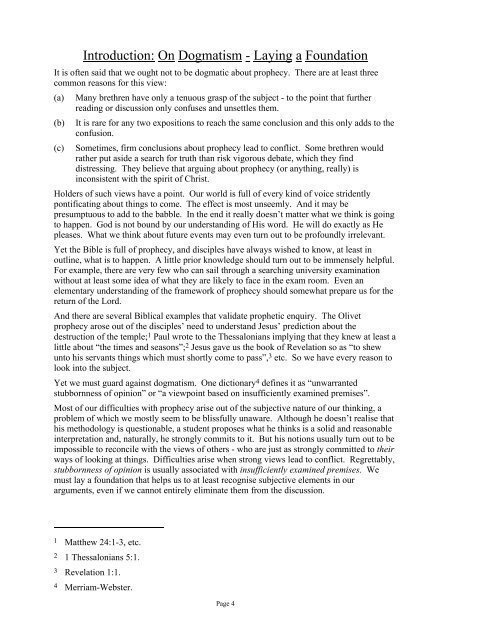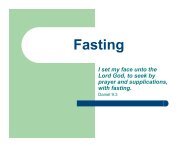Handout - Western Christadelphian Bible School
Handout - Western Christadelphian Bible School
Handout - Western Christadelphian Bible School
Create successful ePaper yourself
Turn your PDF publications into a flip-book with our unique Google optimized e-Paper software.
Introduction: On Dogmatism - Laying a Foundation<br />
It is often said that we ought not to be dogmatic about prophecy. There are at least three<br />
common reasons for this view:<br />
(a) Many brethren have only a tenuous grasp of the subject - to the point that further<br />
reading or discussion only confuses and unsettles them.<br />
(b) It is rare for any two expositions to reach the same conclusion and this only adds to the<br />
confusion.<br />
(c) Sometimes, firm conclusions about prophecy lead to conflict. Some brethren would<br />
rather put aside a search for truth than risk vigorous debate, which they find<br />
distressing. They believe that arguing about prophecy (or anything, really) is<br />
inconsistent with the spirit of Christ.<br />
Holders of such views have a point. Our world is full of every kind of voice stridently<br />
pontificating about things to come. The effect is most unseemly. And it may be<br />
presumptuous to add to the babble. In the end it really doesn’t matter what we think is going<br />
to happen. God is not bound by our understanding of His word. He will do exactly as He<br />
pleases. What we think about future events may even turn out to be profoundly irrelevant.<br />
Yet the <strong>Bible</strong> is full of prophecy, and disciples have always wished to know, at least in<br />
outline, what is to happen. A little prior knowledge should turn out to be immensely helpful.<br />
For example, there are very few who can sail through a searching university examination<br />
without at least some idea of what they are likely to face in the exam room. Even an<br />
elementary understanding of the framework of prophecy should somewhat prepare us for the<br />
return of the Lord.<br />
And there are several Biblical examples that validate prophetic enquiry. The Olivet<br />
prophecy arose out of the disciples’ need to understand Jesus’ prediction about the<br />
destruction of the temple; 1 Paul wrote to the Thessalonians implying that they knew at least a<br />
little about “the times and seasons”; 2 Jesus gave us the book of Revelation so as “to shew<br />
unto his servants things which must shortly come to pass”, 3 etc. So we have every reason to<br />
look into the subject.<br />
Yet we must guard against dogmatism. One dictionary 4 defines it as “unwarranted<br />
stubbornness of opinion” or “a viewpoint based on insufficiently examined premises”.<br />
Most of our difficulties with prophecy arise out of the subjective nature of our thinking, a<br />
problem of which we mostly seem to be blissfully unaware. Although he doesn’t realise that<br />
his methodology is questionable, a student proposes what he thinks is a solid and reasonable<br />
interpretation and, naturally, he strongly commits to it. But his notions usually turn out to be<br />
impossible to reconcile with the views of others - who are just as strongly committed to their<br />
ways of looking at things. Difficulties arise when strong views lead to conflict. Regrettably,<br />
stubbornness of opinion is usually associated with insufficiently examined premises. We<br />
must lay a foundation that helps us to at least recognise subjective elements in our<br />
arguments, even if we cannot entirely eliminate them from the discussion.<br />
1 Matthew 24:1-3, etc.<br />
2 1 Thessalonians 5:1.<br />
3 Revelation 1:1.<br />
4 Merriam-Webster.<br />
Page 4







